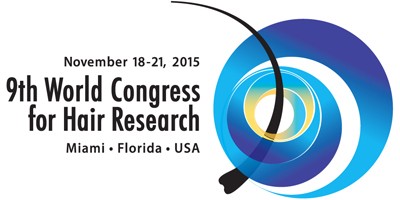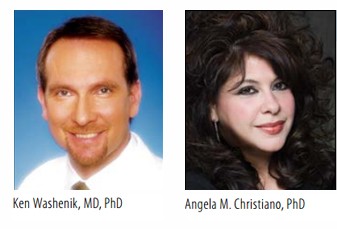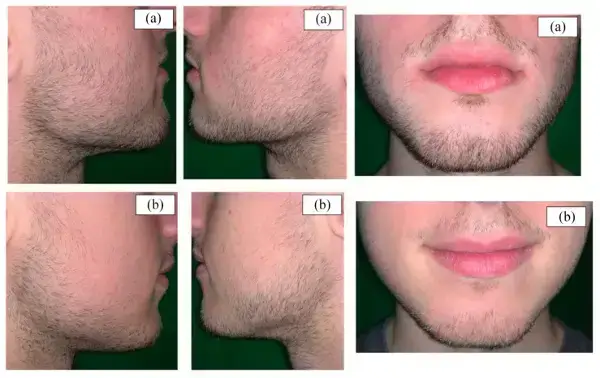Some of the world’s leading authorities on hair loss gather in Miami this week for the 9th annual World Congress for Hair Research. Their goal, as with every year, is to discuss the latest developments in hair growth, hair and scalp disease and clinical care for people with hair loss.
 The event kicked off on Wednesday 18th November with a theme this year of ‘Reflect, Rejuvenate and Regenerate’. Organisers, including the renowned alopecia researcher Dr. Angela Christiano phD, state that their focus is to reflect on hair follicle regeneration and “rejuvenate our minds with new ideas and collaborations.”
The event kicked off on Wednesday 18th November with a theme this year of ‘Reflect, Rejuvenate and Regenerate’. Organisers, including the renowned alopecia researcher Dr. Angela Christiano phD, state that their focus is to reflect on hair follicle regeneration and “rejuvenate our minds with new ideas and collaborations.”
There are a number of presentations expected to gather a large audience, including:
An update on RepliCel
RepliCel Life Sciences is a Vancouver-based company with expertise in the fields of skin ageing and tendinosis and, increasingly, genetic hair loss. Their approach to dealing with male and female pattern hair loss is based around stem cells, and David Hall, their CEO, has previously said: “We’re not asking these cells to do anything other than what they naturally do, or be anything more than they are.” Their Managing Director, Rolf Hoffmann has been invited to speak and may be able to predict when RepliCel’s ‘hair cloning’ technique will be available to the general public.

Co-Chair Dr Angela Christiano and Ken Washenik MD will both be hosting panels
The latest findings with regards Cicatricial Alopecia
Also known as Scarring Alopecia, this relatively rare form of hair loss is difficult to treat because of the damage the scarring (sometimes caused by fire) causes to the hair follicles. Dr. Elise Olsen of Duke University Medical Centre, who co-authored the SALT scale for measuring how much of a person’s scalp is affected by Alopecia Areata, is one of several people invited to speak on this subject.
An afternoon session on emerging therapies and technologies
Highlighting the global commitment to and interest in finding new treatments for various types of hair loss, a whole afternoon at the event has been designated to bring delegates up to speed with emerging technologies. The session will include a talk by stem cell specialist Ken Washenik.
A talk about the effects hormones have on hair growth and hair loss
Valerie A. Randall, Professor of Biomedical Sciences, Centre For Skin Sciences at the University of Bradford is one several people who will bring attendees up to speed on the latest findings with regards how hormones affect hair loss.
 An update on current clinical trials investigating treatment for various forms of hair loss
An update on current clinical trials investigating treatment for various forms of hair loss
The director of this segment is Dr. Jerry Shapiro of New York University, who will also act as moderator. Several leading figures in hair loss are scheduled to speak at this session where Belgravia is hoping to hear an update on how the trials exploring JAK inhibitors for the treatment of Alopecia Areata are progressing.
One especially encouraging addition to the congress this year is a session teaching hair professionals how to identify a range of hair loss conditions. When properly informed, hairdressers would be well suited to act as an ‘early warning system’ when it comes to detecting issues. Presently, however, many would fail to spot conditions that would be very obvious to the scientists attending the congress, who are involved in highly specialised medical research.
We will post any significant information from the congress on the Belgravia hair loss blog as it becomes available.
 The Belgravia Centre—————————————————————————————————–
The Belgravia Centre—————————————————————————————————–
The Belgravia Centre is the leader in hair loss treatment in the UK, with two clinics based in Central London. If you are worried about hair loss you can arrange a free consultation with a hair loss expert or complete our Online Consultation Form from anywhere in the UK or the rest of the world. View our Hair Loss Success Stories, which are the largest collection of such success stories in the world and demonstrate the levels of success that so many of Belgravia’s patients achieve. You can also phone 020 7730 6666 any time for our hair loss helpline or to arrange a free consultation.
